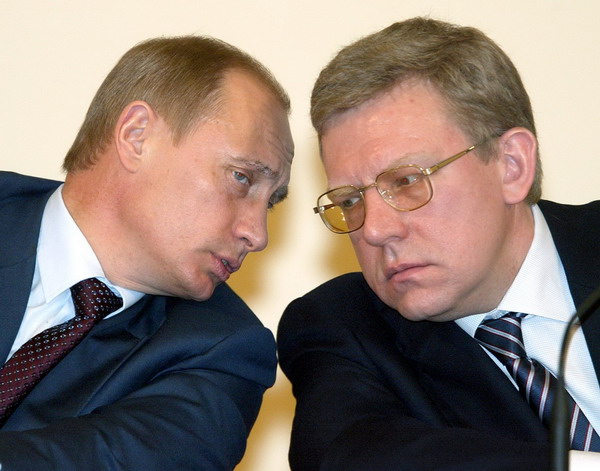Politics
Russia's finance cheif rebels over Putin
Updated: 2011-09-26 10:40
(Agencies)
|
 Russia's then President Vladimir Putin (L) and Finance Minister Alexei Kudrin speak to each other during a meeting of Russia's economic ministers in Moscow, in this file photo taken March 19, 2004. Kudrin has ruled out working in the next government if President Dmitry Medvedev swaps jobs with Vladimir Putin to become prime minister. [Photo/Agencies]
|
Foreign investors were alarmed by Alexei Kudrin's snub after Putin announced he will run for president next March in an election that could extend his rule until 2024.
Kudrin, a Putin ally, has prime ministerial ambitions and said he had "disagreements" with Medvedev who may now struggle to establish his credibility as premier after being forced by Putin to renounce his dream of a second term as president.
"I do not see myself in a new government," Kudrin, 50, said in comments released in Washington, where he was meeting global policymakers.
"The point is not that nobody has offered me the job; I think that the disagreements I have (with Medvedev) will not allow me to join this government."
Kudrin won the respect of investors as a guardian of financial stability by saving windfall oil revenues for a rainy-day fund which helped Russia through the 2008 global economic crisis.
"Kudrin personifies Russia's macro- and fiscal stability. His departure would be a major blow to the Russian investment case," said Roland Nash, chief strategist at Russian investment manager Verno Capital.
"But I don't think you should count him out quite yet. He is as close to Putin as Medvedev. Perhaps this is a bid for the role of prime minister."
Power-sharing agreement
Putin, 58, and Medvedev, 46, have ruled in a power 'tandem' since Putin was forced to yield the presidency in 2008 after serving the maximum two consecutive terms.
Putin won a standing ovation by accepting a proposal by Medvedev to return as president at a choreographed congress of the ruling United Russia party on Saturday.
Medvedev agreed to lead United Russia's list of candidates for a parliamentary election on Dec. 4 in a move intended to help the party retain a two-thirds majority in the lower house.
Putin looks certain to be elected president in March.
Opinion polls show other potential presidential candidates, such as nationalist Vladimir Zhirinovsky or Communist Gennady Zyuganov, have little support and liberal opposition leaders have only limited appeal nationwide.
But although Medvedev's personal ratings are high, the strength of his prime ministerial credentials are unclear after he failed to carry out many of his reform promises as president.
"Medvedev's usefulness runs out on Dec. 5," one economist said, referring to the day after the parliamentary election.
Medvedev has failed to emerge from Putin's shadow since they started sharing power. By contrast, Putin has in more than a decade in power cultivated the image of a vigorous leader and his policies - crushing a Chechen separatist rebellion, taming super-rich businessmen and bringing wayward regions to heel - have buttressed his popularity among Russians.
E-paper

Pearl paradise
Dreams of a 'crazy' man turned out to be a real pearler for city
Literary beacon
Venice of china
Up to the mark
Specials

Power of profit
Western companies can learn from management practices of firms in emerging economies

Test of character
Keyboard-dependent Chinese are returning to school because they have forgotten how to write

Foreign-friendly skies
About a year ago, 48-year-old Roy Weinberg gave up his job with US Airways, moved to Shanghai and became a captain for China's Spring Airlines.
